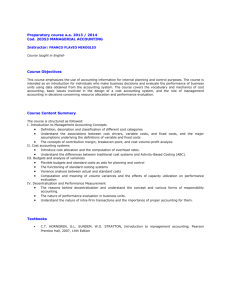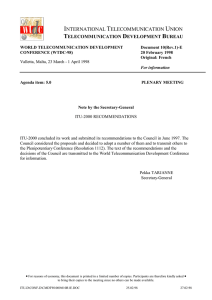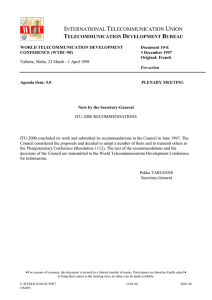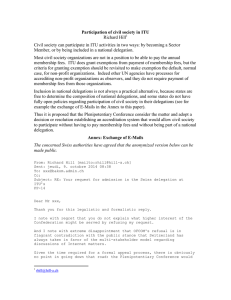DECISION (Marrakesh, 2002) 7 Review of the management of the Union
advertisement
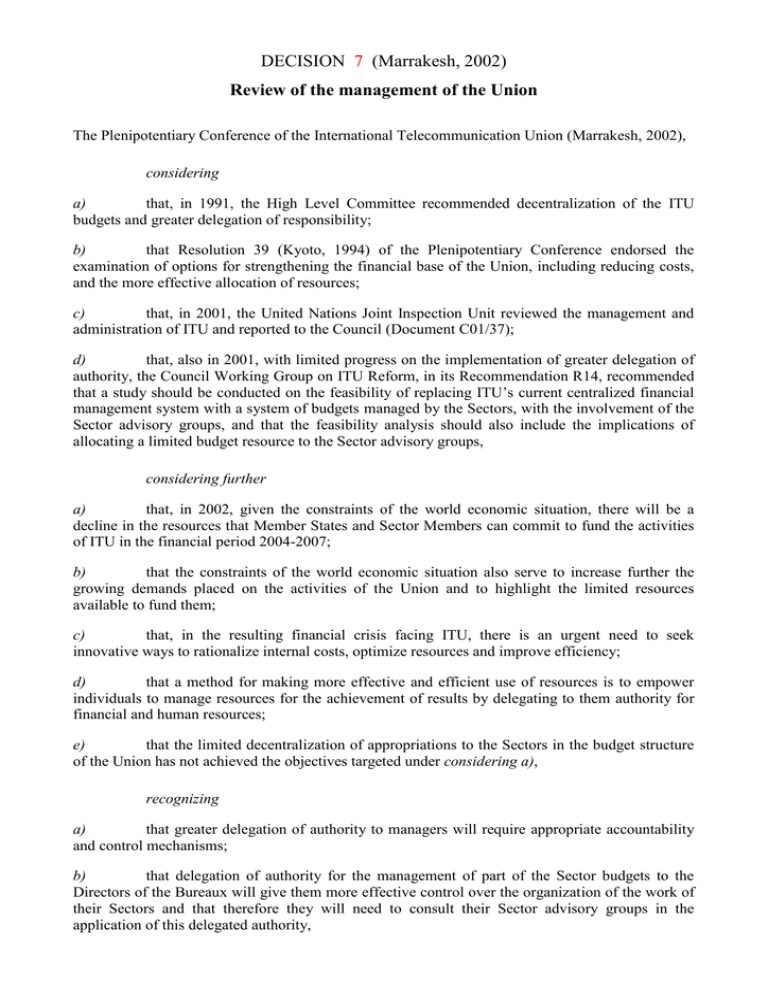
DECISION 7 (Marrakesh, 2002) Review of the management of the Union The Plenipotentiary Conference of the International Telecommunication Union (Marrakesh, 2002), considering a) that, in 1991, the High Level Committee recommended decentralization of the ITU budgets and greater delegation of responsibility; b) that Resolution 39 (Kyoto, 1994) of the Plenipotentiary Conference endorsed the examination of options for strengthening the financial base of the Union, including reducing costs, and the more effective allocation of resources; c) that, in 2001, the United Nations Joint Inspection Unit reviewed the management and administration of ITU and reported to the Council (Document C01/37); d) that, also in 2001, with limited progress on the implementation of greater delegation of authority, the Council Working Group on ITU Reform, in its Recommendation R14, recommended that a study should be conducted on the feasibility of replacing ITU’s current centralized financial management system with a system of budgets managed by the Sectors, with the involvement of the Sector advisory groups, and that the feasibility analysis should also include the implications of allocating a limited budget resource to the Sector advisory groups, considering further a) that, in 2002, given the constraints of the world economic situation, there will be a decline in the resources that Member States and Sector Members can commit to fund the activities of ITU in the financial period 2004-2007; b) that the constraints of the world economic situation also serve to increase further the growing demands placed on the activities of the Union and to highlight the limited resources available to fund them; c) that, in the resulting financial crisis facing ITU, there is an urgent need to seek innovative ways to rationalize internal costs, optimize resources and improve efficiency; d) that a method for making more effective and efficient use of resources is to empower individuals to manage resources for the achievement of results by delegating to them authority for financial and human resources; e) that the limited decentralization of appropriations to the Sectors in the budget structure of the Union has not achieved the objectives targeted under considering a), recognizing a) that greater delegation of authority to managers will require appropriate accountability and control mechanisms; b) that delegation of authority for the management of part of the Sector budgets to the Directors of the Bureaux will give them more effective control over the organization of the work of their Sectors and that therefore they will need to consult their Sector advisory groups in the application of this delegated authority, 2 decides 1 that, since significant benefits in terms of effectiveness and efficiency can be expected from carefully planned further decentralization of the Union’s resources, this decentralization shall be implemented and reviewed by the Council based on the work of a group of experts; 2 that, in order to improve effectiveness and efficiency, the Secretary-General shall delegate authority to the Directors of the Bureaux for the management of their Sector budgets once the control mechanisms identified in the management review are in place, decides further that decides 2 will give the Directors of the Bureaux much greater control over the Sector operational plans and that the delegation of authority for the Sector budgets should be exercised following advice from the Sector advisory groups, instructs the extraordinary session of the Council to be held during this conference 1 to establish a group of specialists, one from each administrative region, to undertake as a matter of urgency the work described in the annex to this decision, in consultation with the Secretary-General, the Directors of the Bureaux and the Sector advisory groups; 2 to request the group of specialists to report to the 2003 session of the Council in order that this decision may be fully implemented by that time and may be used in conjunction with the examination of the draft budget 2004-2005, instructs the Council 1 to review the proposed measures and take appropriate action to enforce implementation; 2 to monitor the implementation of this decision at each subsequent session of the Council and to report to the next plenipotentiary conference on the implementation of this decision and any consequential amendments that may be necessary to the ITU Constitution and the Convention, instructs the Secretary-General 1 to identify, in consultation with the Coordination Committee, areas of the budget where further decentralization of appropriations can be implemented, including transfers between budget appropriations; 2 to make the annual report of the internal auditor of the Union available to the Council; 3 to make the minutes of Coordination Committee meetings available on the Council website, excluding confidential staff matters. ANNEX TO DECISION 7 (Marrakesh, 2002) Group of specialists to review the management of the Union The purpose of the Group of Specialists to review the management of the Union shall be to undertake, as a matter of urgency, studies on the overall management of the Union, in order that the results of the studies are implemented in time for the 2004-2005 biennial budget. The experts serving on the group shall be provided by administrations, at their own cost. 3 Terms of reference To identify and evaluate options, with supporting pros and cons, relating to the effectiveness, efficiency and economy of the management and administration of the Union as a whole, considering all elements that would contribute to efficient and effective fulfilment of the functions and duties of ITU, and in particular to review: 1) the organization of the Union’s financial management, including: i) performing a thorough examination of ITU, including the system of budgets managed by the Sectors, so as to identify all opportunities for savings and ensure maximum economic use of the Union’s resources; ii) identifying the necessary control mechanisms to ensure appropriate accountability and control, including any role the Deputy Secretary-General might take in financial approval; iii) recommending appropriate changes to the Financial Regulations; 2) various functions, to see how they could further support the activities of the Union and in the light of the changes in priorities of the membership (e.g. the library and the Strategy and Policy Unit (SPU)); 3) the present distribution of tasks related to documentation and publications among the relevant departments of the General Secretariat and the Bureaux, identifying situations which give rise to problems of quality control, and clarifying the assignment of responsibilities and accountability; 4) interpretation and translation staffing and systems, including partial outsourcing (see Document PP02/115); 5) the provision of financial information to Member States; 6) better use of the centralized support services of the General Secretariat in order to achieve cost reduction in relation to TELECOM activities; 7) common administrative functions of each Sector, including their consolidation into the General Secretariat; 8) simplification of internal procedures.


